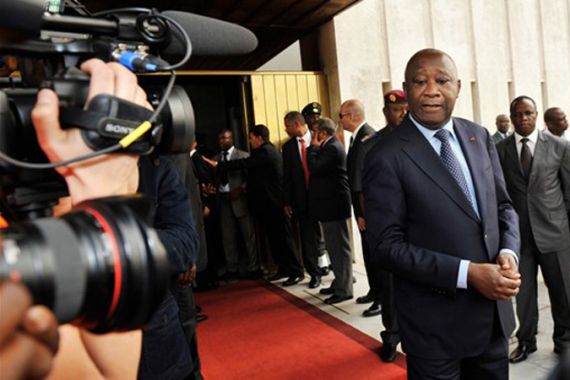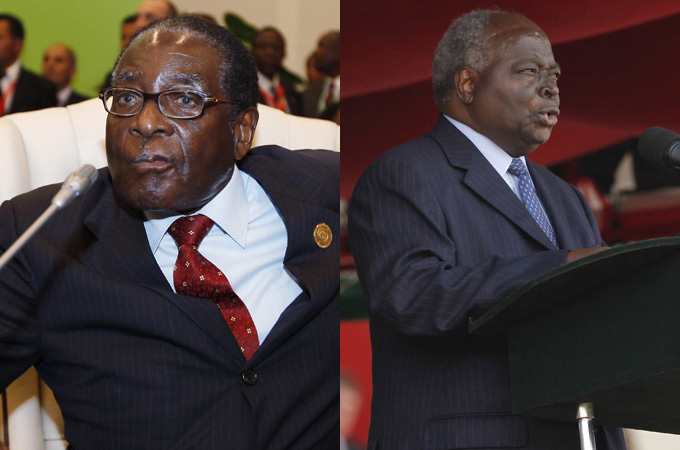Africa’s old guard on the run?
Cote d’Ivoire’s Laurent Gbagbo is just the latest in a line of African strongmen who find themselves pressed.

 |
| Zimbabwe president Robert Mugabe (L) and Kenya president Mwai Kibaki (R) managed to survive electoral challenges through force, but Cote d’Ivoire’s Laurent Gbagbo may not be as lucky [REUTERS and EPA] |
Laurent Gbagbo, the embattled and disputed leader of the west African nation of Cote d’Ivoire, seems increasingly likely to be forced to step down and accept the widely condoned victory of his opponent, longtime Ivorian politician and former International Monetary Fund economist Alassane Ouattara.
The noose is tightening around Gbagbo, who has served as the country’s president since a tumultuous 2000 election and has rejected Ouattara’s December 2 victory at the polls – one that has been recognized by the United Nations, United States, European Union and African Union (AU), and has been followed by a possibly widespread campaign of government intimidation and murder.
Regional forces, such as the Nigeria-led Economic Community of West African States (ECOWAS) and an AU delegation captained by Kenyan prime minister Raila Odinga – a man, like Ouattara, familiar with challenging obstinate leaders – have tried to persuade Gbagbo with several approaches: offering amnesty and exile, a power-sharing agreement, or the threat of military force.
A cloud is forming around Gbagbo, Odinga said Tuesday, and Gbagbo now “appreciates the gravity of the situation”.
Furthermore, Cote d’Ivoire is also burning the fuse on a one-month grace period after missing a payment on a $2.3 bn Eurobond, and the World Bank has frozen more than $800 mn worth of aid to the country. Gbagbo’s administration may find itself soon unable to pay the salaries of government workers and soldiers.
All the elements – unanimous international opinion foremost among them – seem to be in place to ensure a transition to an Ouattara-led government, rather than the kind of ineffective power-sharing agreement that has followed electoral disputes in other African nations.
But is it fair to compare the situation in Cote d’Ivoire with the recent crises in Kenya and Zimbabwe, where longtime political strongmen appeared to lose at the ballot box but fought to retain power? Is this the beginning of a trend toward forceful democratization in Africa?
The Cote d’Ivoire difference: civil war
Rinaldo Depagne, the International Crisis Group’s senior West Africa analyst, didn’t warm to the Kenya-Zimbabwe comparison.
It’s true, Depagne allowed, that leaders have fought to retain their presidential seats in all three countries following apparent defeats, but there are unique factors at play in Cote d’Ivoire.
In Kenya in 2007, after incumbent president Mwai Kibaki snuck in his second-term swearing-in during a nighttime ceremony after being declared the victor in an election against Odinga that was regarded as fraudulent – with vote-counting completed in secrecy – hundreds of thousands of people were displaced and thousands reportedly killed in the resulting unrest, which required a United Nations-brokered resolution.
In Zimbabwe the following year, Robert Mugabe, president for 23 years, lost the first round of the presidential election – even after a dubiously conducted recount – but challenger Morgan Tsvangirai, a former Mugabe supporter and experienced Zimbabwean politician, withdrew rather than participate in a run-off that he and his supporters worried would be marred by fraud and violence.
In both Zimbabwe and Kenya, the old guard managed to hold onto power in the traditional way – by refusing to compromise and asserting itself through violence. But the situation in Cote d’Ivoire is different, Depagne said. The country remains essentially split between north and south after five years of civil war, and the international and African community seem to have no appetite to allow the world’s largest exporter of coffee and palm oil and a major driver of the west African economy to fall back into turmoil.
“For example, if you’ve got a crisis in the Gambia, I’m not sure the international community will pay so much attention, because, well, it’s not very important … for the regional stability,” he said.
The international community also fears that if Cote d’Ivoire were to fall back into war – and observers say hundreds may have already been killed in post-election fighting – large numbers of immigrants who have gravitated to the country from neighbours such as Mali and Burkina Faso would likely flee back to and destabilise their homelands, he said.
International powers, Depagne said, had hoped Cote d’Ivoire would return to peace following the election, but that outcome hasn’t materialised.
“People in Washington and Paris and London are anxious now,” he said.
A new attitude in the AU
Nevertheless, Depagne agrees that the African show of unity against Gbagbo may represent the beginning of a trend toward more forceful democratization efforts in the sub-Saharan region.
It’s been less than a month since Gbagbo refused to acknowledge Ouattara’s election victory, but already the African Union has suspended Cote d’Ivoire’s membership, and ECOWAS has threatened Gbagbo with “legitimate force” if he does not step down.
By appointing Odinga, the man who “lost” to Kenya’s Kibaki in 2007, as its designated representative to resolve the situation, the AU may also have indicated its favour for a new guard of politicians, rather than the ossifying leaders who have held power tenaciously, in some cases for decades.
“I think it will be more and more difficult for old African leaders, or for any kind of African leaders who want to impose a kind of dictatorship,” Depagne said.
Afyare Elmi, a professor of international affairs at Qatar University, said that Gbagbo’s likely ouster in Cote d’Ivoire represents a step toward democracy and the inclusion of minority groups in the region, but he cautioned against too much optimism.
The difference in Cote d’Ivoire, Elmi said, is the presence of UN troops and the immediate intervention of ECOWAS, led by Nigerian president Jonathan Goodluck.
In Kenya, he said, those who wanted to see a peaceful transition to Odinga had only diplomatic leverage to apply.
“They were basically begging Kibaki,” he said.
Though the situation in Cote d’Ivoire appears to be turning out positively, Elmi said it may be too soon to declare Ouattara’s rise a major victory for new, democratic sub-Saharan leaders.
When Yoweri Museveni helped topple old regimes in Uganda and eventually came to power as president in 1986, Elmi noted, many wrote about him positively. But 24 years later, having led an invasion of the Democratic Republic of Congo, abolished presidential term limits, and suppressed the media and democratic opponents, Museveni remains in charge.
“Those who we are calling old guard were [once] considered young and progressive leaders,” Elmi said.
No patience for “power sharing” anymore
Though Gbagbo still refuses to relinquish power, his brinkmanship has gradually receded to the point where, on Tuesday, he agreed to meet face-to-face with Ouattara and other African representatives from ECOWAS and the AU to resolve the stand-off.
Neither Elmi nor Depagne see the crisis ending favourably for Gbagbo – with some kind of power-sharing agreement – given the failure of such arrangements in the past.
Gbagbo already made a compromise in 2007, Depagne said, when he signed a peace agreement with northern rebel leader Guillaume Soro that made Soro the nation’s prime minister. Presidential elections were postponed until 2010, and Soro was barred from running by the agreement and eventually resigned his post. Despite rumours that Soro would back Gbagbo in exchange for Gbagbo’s later support, Soro threw himself behind Ouattara.
Elmi believes Gbagbo will step down but said Ouattara will likely include in his administration “young, dynamic” members of the president’s Popular Front party as a concession to reassure Gbagbo’s supporters, who have rallied around Gbagbo’s appeal to native Ivorian ethnic allegiances and against those perceived as foreigners.
Whatever happens, both Elmi and Depagne agree the bar is low for democratic success in Africa.
“I think the Africans like Gbagbo and Kibaki and Mugabe … at least they can save their nations from going to another war again,” Elmi said. “I think the major achievement in [Kenya and Zimbabwe] is that there is no war”.
Said Depagne: “Is it possible to organise an election in Africa and to see the strongman withdraw from power … Apparently it’s very difficult to see a positive answer to this question”.